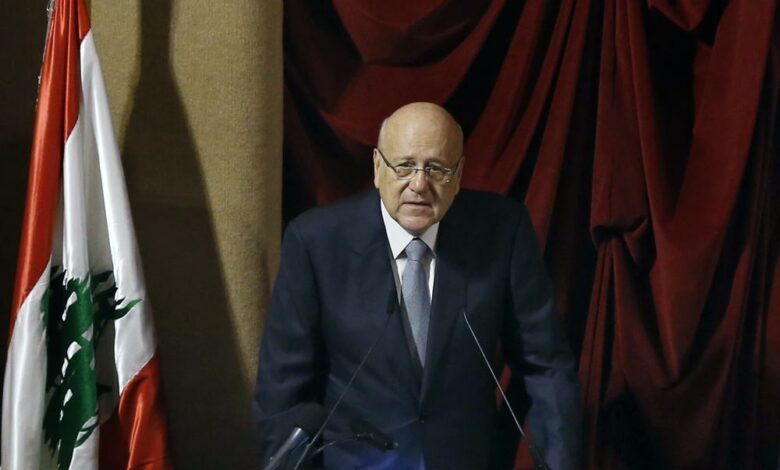
The electricity outage underscored the multiple crises roiling the small Mediterranean nation amid an unprecedented economic meltdown, including a fuel shortage that has paralyzed the country.
Nevertheless, Prime Minister Najib Mikati’s government, which was formed earlier this month after more than a year of bickering among politicians as the crisis worsened, won votes from the majority of parliament members present in the 128-member legislature.
The vote paves the way for his Cabinet to try and tackle the country’s devastating economic and financial crisis that has impoverished more than half the population within months and left the national currency in freefall, driving inflation to previously unseen levels.
“From the heart of the suffering of Beirut … our government has emerged to light a candle in this darkness,” Mikati said, addressing lawmakers at the session.
Mikati pledged to get to work immediately to halt the collapse and ease the day-to-day suffering of the Lebanese.
“What happened here today with the electricity outage pales in comparison to what the Lebanese people have been suffering for months,” Mikati added.
As he read out the government’s policy statement, he was interrupted by Lebanon’s Parliament Speaker Nabih Berri, who asked him to skip over some parts as it was not clear how long the electricity would stay on.
Lebanese have been living with electricity blackouts and severe shortages in fuel, diesel and medicine for months, forcing hospitals to reduce their operations and threatening to shut down bakeries and schools. Lines stretching several kilometers (miles) of people waiting to fill up their tanks are a daily occurrence at gas stations across the country.
The crisis is rooted in decades of corruption and mismanagement by a political class that has ruled the country since the end of Lebanon’s 15-year civil war in 1990.
The new government faces an arduous and uncertain path. It is expected to undertake critically needed reforms, as well as manage public anger and tensions resulting from the planned lifting of fuel subsidies by the end of the month. Lebanon’s foreign reserves have been running dangerously low, and the central bank in the import-dependent country has said it was no longer able to support its $6 billion subsidy program.
The government is also expected to oversee a financial audit of the Central Bank and resume negotiations with the International Monetary Fund for a rescue package.
Mikati, a billionaire businessman and one of the richest men in Lebanon, pledged to do all that in his Cabinet’s policy statement. But few believe that can be done with a government that leaves power in the hands of the same political parties that the public blames for corruption and mismanagement of Lebanon’s resources.
Mikati is returning to the post of prime minister for the third time and is widely seen as part of Lebanon’s post-civil war ruling elite that enriched themselves while doing little to develop the country.
“Lebanon so desperately needed a messiah that it was willing to settle for a false one,” wrote Christophe Abi-Nassif, director of the Lebanon program at the Middle East Institute, in an analysis. “The country’s socio-economic situation might actually improve, but at the cost of legitimizing the establishment once again in the eyes of many Lebanese,” he added.
Monday’s parliament session was being held at a Beirut theater known as the UNESCO palace so that parliament members could observe social distancing measures imposed over the coronavirus pandemic.
Lawmakers who sweated as they stood outside the venue waiting for the electricity issue to be resolved, derided the outage as emblematic of Lebanon’s problems.
“It is not a good sign,” said lawmaker Faisal Sayegh. “We need to light up this hall, to say to people that we can light up the country.”



